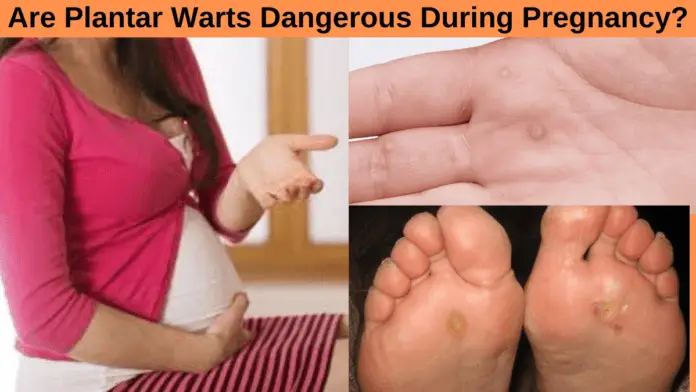
Pregnancy is a time when women experience many changes in their bodies, including an increased risk of developing certain conditions. One such condition is plantar warts, which are caused by the human papillomavirus (HPV). Many women wonder if plantar warts are dangerous during pregnancy and what they can do to treat them safely. In this article, we will explore the risks associated with plantar warts during pregnancy and provide tips for safe treatment.
What are Plantar Warts?
Plantar warts are small growths that appear on the soles of the feet. They are caused by HPV, which enters the body through tiny cuts or breaks in the skin. Plantar warts can be painful and uncomfortable, making it difficult to walk or stand for long periods of time.
Are Plantar Warts Dangerous During Pregnancy?
While plantar warts can be uncomfortable and unsightly, they are generally not considered dangerous during pregnancy. The strains of HPV that cause plantar warts are not highly contagious, so you may not necessarily contract a wart-causing virus even if you come into contact with someone who has them. Read: Are Plantar Warts Contagious?
However, it is important to note that some strains of HPV can cause more serious health problems, such as cervical cancer. If you have any concerns about your HPV status or your risk for developing cervical cancer, talk to your healthcare provider.
Treating Plantar Warts During Pregnancy
If you develop plantar warts during pregnancy, there are several safe and effective treatment options available:
1. Apple Cider Vinegar
One popular home remedy for treating plantar warts is apple cider vinegar. Soak a cotton ball in apple cider vinegar and apply it directly to the wart. Cover with a bandage and leave on overnight. Repeat this process every night until the wart disappears.
2. Duct Tape
Another home remedy involves covering the wart with duct tape for several days at a time. After removing the tape, soak the affected area in warm water and use a pumice stone to gently remove any dead skin cells from the surface of the wart.
3. Freezing
Cryotherapy is a common medical treatment for plantar warts that involves freezing them off using liquid nitrogen. This treatment is generally considered safe during pregnancy as long as proper precautions are taken.
4. Salicylic Acid
Over-the-counter products containing salicylic acid can also be used to treat plantar warts during pregnancy. Apply the product directly to the wart according to package instructions.
It is important to note that some treatments may not be appropriate for all women during pregnancy. Always consult with your healthcare provider before starting any new treatments or medications.
Read Also: Period-Like Pain During Pregnancy: Causes, Treatments
Prevention Tips
The best way to prevent plantar warts during pregnancy is to practice good foot hygiene:
- Keep your feet clean and dry
- Wear clean socks every day
- Avoid walking barefoot in public places
- Change out of sweaty shoes and socks as soon as possible
- Avoid sharing shoes or socks with others
Conclusion
Plantar warts may be uncomfortable and unsightly, but they are generally not considered dangerous during pregnancy. There are several safe and effective treatment options available, including home remedies like apple cider vinegar and duct tape as well as medical treatments like cryotherapy and salicylic acid products.
By practicing good foot hygiene and taking steps to prevent infection, you can reduce your risk of developing plantar warts during pregnancy. If you have any concerns about your HPV status or your risk for developing cervical cancer, talk to your healthcare provider for more information.











